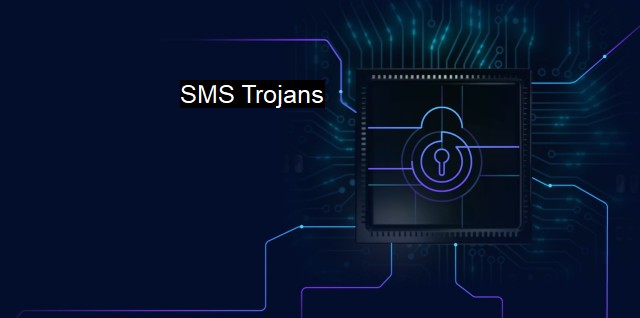What are SMS Trojans?
Exploring SMS Trojans: Cybercriminals' Latest Weapon in Targeting Mobile Devices for Financial Fraud and Data Theft
SMS Trojans are malicious software that infiltrate mobile devices, typically smartphones and tablets. They cloak themselves to appear as seemingly harmless applications, and once downloaded, gather user data or provide unauthorized and invisible access to users’ operating systems. They're named after the Trojan horse from Greek mythology due to their deceptive mechanisms; much like the Greeks gaining access to Troy through a feigned peace offering, SMS Trojans fool end-users into disregarding their digital arsenal and sneak in undetected.Among the various forms of Trojan viruses such as ransomware, info stealers, backdoors, and botnets, SMS Trojans capitalize on the widespread use of mobile messaging services. They primarily operate by sending out unauthorized text messages from the infected device without users’ knowledge. These messages often contain other types of malicious files, spreading the Trojan to more users, or send out premium-rate text messages that charge the users heavily, thereby benefiting the attackers financially.
SMS Trojans gain access to mobile devices through various methods that exploit vulnerabilities in the device’s messaging service. One common practice is through phishing scams where attackers sent unsolicited text messages containing malicious links or attachment files. Once the user clicks on the link or download the attachment, they inadvertently activate the Trojan which then hijacks their device.
These Trojans can also infect smartphones through illegal applications downloaded from third-party app stores. These stores often cannot guarantee the same level of security as play stores provided by phone manufacturers or operating system providers. Infected software or applications get downloaded into the device, thereby giving access to the Trojan. From this point, it can control the messaging operations, send unauthorized messages, or initiate any action conceived by cyber attackers.
The scope of destruction from an SMS Trojan extends beyond unauthorized messaging costs to invading privacy and stealing sensitive information from infiltrated devices. Personal data including access credentials, credit card data, and bank account details may be at risk. Confidential business communications might also be accessed, leading to corporate espionage. The more advanced malware versions continually develop to invade secure systems, encrypt data, exploit financial transactions, disrupt regular operations, and cause other cyber nuisance.
Antivirus software plays a critical role in the prevention and control of SMS Trojans. An effective antivirus will monitor for malicious activities, quarantine suspicious files, and remove any seemingly detrimental software from the user’s device. It’ll also provide alerts for suspicious activities to enable user action.
Up-to-date antivirus solutions leverage AI and machine learning to detect viruses of this nature. They compare signatures of incoming files against a database of known threats and auto-update to stay ahead of the constant evolution of malware threats. Smartphone users are strongly recommended to avoid clicking on unsolicited text messages and links, to download and frequently update robust antivirus software, to download applications only from trusted stores, to keep the operating system updated, and to regularly monitor message consumptions for any breaches in cyber hygiene.
The rise of SMS Trojans emphasizes the significance of ongoing vigilance in the cyber world today. With the increasing volume of sensitive data being uploaded and exchanged on mobile devices daily, the damages that Trojans could potentially inflict have far-reaching implications. Cybersecurity best practices, together with advanced antivirus software solutions, play an indispensable part in outmaneuvering SMS Trojans and fortifying the digital frontier. given the potential gravity of the risk, individuals, corporates, and cyber authorities should foster concerted efforts against these cyber attack tactics.

SMS Trojans FAQs
What are SMS trojans?
SMS Trojans are a type of malware that masquerades as a genuine messaging app or service and sends unauthorized text messages or makes unauthorized calls to premium numbers, generating revenue for cybercriminals.How do SMS trojans infect a device?
SMS Trojans can infect a device through malicious links or attachments in text messages, emails, or social media messages. They can also be downloaded from third-party app stores or disguise themselves as legitimate apps in official app stores.What are the consequences of SMS Trojan infection?
The consequences of an SMS Trojan infection can range from unauthorized charges on the victim's phone bill to complete takeover of the device, allowing the cybercriminal to access sensitive information or use the device for further attacks.How can I protect my device from SMS Trojans?
To protect your device from SMS Trojans, you should always be cautious when opening links or attachments from unknown or suspicious sources. Use trusted antivirus software to detect and remove potential threats and keep your operating system and apps up-to-date with the latest security patches.| | A | | | B | | | C | | | D | | | E | | | F | | | G | | | H | | | I | | | J | | | K | | | L | | | M | |
| | N | | | O | | | P | | | Q | | | R | | | S | | | T | | | U | | | V | | | W | | | X | | | Y | | | Z | |
| | 1 | | | 2 | | | 3 | | | 4 | | | 7 | | | 8 | | |||||||